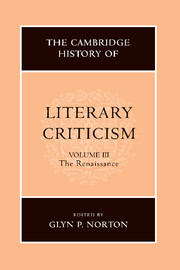Book contents
- Frontmatter
- Introduction
- READING AND INTERPRETATION: AN EMERGING DISCOURSE OF POETICS
- POETICS
- THEORIES OF PROSE FICTION
- CONTEXTS OF CRITICISM: METROPOLITAN CULTURE AND SOCIO-LITERARY ENVIRONMENTS
- VOICES OF DISSENT
- STRUCTURES OF THOUGHT
- 45 Renaissance Neoplatonism
- 46 Cosmography and poetics
- 47 Natural philosophy and the ‘new science’
- 48 Stoicism and Epicureanism: philosophical revival and literary repercussions
- 49 Calvinism and post-Tridentine developments
- 50 Port-Royal and Jansenism
- NEOCLASSICAL ISSUES: BEAUTY, JUDGEMENT, PERSUASION, POLEMICS
- A SURVEY OF NATIONAL DEVELOPMENTS
- Bibliography
- Index
- References
49 - Calvinism and post-Tridentine developments
from STRUCTURES OF THOUGHT
Published online by Cambridge University Press: 28 March 2008
- Frontmatter
- Introduction
- READING AND INTERPRETATION: AN EMERGING DISCOURSE OF POETICS
- POETICS
- THEORIES OF PROSE FICTION
- CONTEXTS OF CRITICISM: METROPOLITAN CULTURE AND SOCIO-LITERARY ENVIRONMENTS
- VOICES OF DISSENT
- STRUCTURES OF THOUGHT
- 45 Renaissance Neoplatonism
- 46 Cosmography and poetics
- 47 Natural philosophy and the ‘new science’
- 48 Stoicism and Epicureanism: philosophical revival and literary repercussions
- 49 Calvinism and post-Tridentine developments
- 50 Port-Royal and Jansenism
- NEOCLASSICAL ISSUES: BEAUTY, JUDGEMENT, PERSUASION, POLEMICS
- A SURVEY OF NATIONAL DEVELOPMENTS
- Bibliography
- Index
- References
Summary
Born in Noyon, France in 1509, John Calvin left his homeland due to religious persecution exercised by Francis I on Evangelical and Reformed believers at the time of the Affaire des placards (1534). Marguerite de Navarre, sister of Francis I and a devout Evangelical with close connections to Jacques Lefévre d'Etaples, Guillaume Briçonnet, and the Cercle de Meaux, was a friend of and patron to many Calvinists, among them the poet Clément Marot who provided the first Protestant translation of the Psalms into French (1543), and Calvin himself. Calvin was influenced by, and in turn influenced, French Evangelicals. By 1541, the date of the publication of his Institution de la religion chrestienne, Calvin had established himself in Geneva and had begun his attempt to reconfigure Geneva as a Protestant anti-Rome.
Calvinist literature develops in Switzerland and France. It can be said to be a godfather to later Puritan literature in Scotland and England, notably in John Bunyan's Grace abounding to the chief of sinners (1666), with its depiction of the sinful self as literary creator or in the Calvinist pessimism of Jacobean tragedy. Calvinist literature also demonstrates some affliations with Evangelical literary production, most notably Bonaventure des Périers's Cymbalum mundi (1537), an allegorical satire on religious persecution, some of the religious-flavoured tales of Marguerite de Navarre's L'Heptaméron, and the religious satire found in Rabelais's Quart livre (1548).
Calvinist literature is primarily informed by theology. It is grounded in a paradox. The Calvinist injunction was to ignore the self so that the self would not hinder the focus on God. However, the Calvinist tradition of individual spiritual examination of conscience (in contrast to the mediated system of priestly confession in Catholicism) gave rise to an intense anxiety about the self, and a constant surveillance of it. That ultimately resulted in literary expression of that self’s concerns and world-view. Increasingly, the Calvinist confessional perspective informed the content of the written work.
- Type
- Chapter
- Information
- The Cambridge History of Literary Criticism , pp. 466 - 474Publisher: Cambridge University PressPrint publication year: 1999

